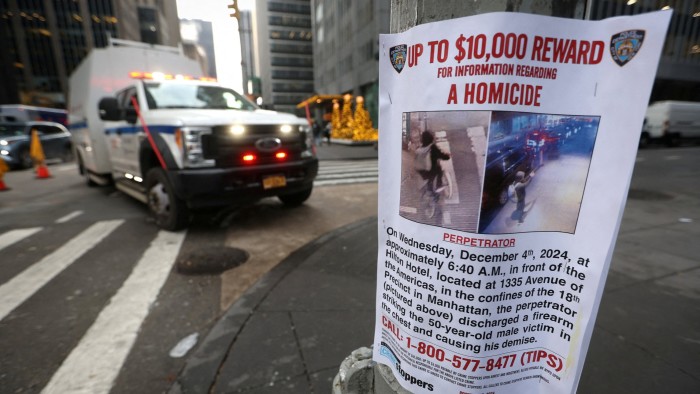Unlock the Editor’s Digest for free
Roula Khalaf, Editor of the FT, selects her favourite stories in this weekly newsletter.
The killing on Wednesday of a top UnitedHealth Group executive unleashed a wave of commiseration, but also revelry, underscoring the frustration among Americans who view the healthcare system as broken.
The most popular posts on social media site X referring to UnitedHealth following the slaying of Brian Thompson “either expressed explicit or implicit support for the killing or denigrated the victim”, according to research by New Jersey’s Rutgers University. Many users of other social media apps such as TikTok posted similar messages.
The barrage of criticism aimed at UnitedHealth, a healthcare and insurance company that serves tens of millions of Americans, as well as Thompson highlights how the industry is grappling with controversy over everything from the cost of care and drugs to the prevalence of medical debt.
“Today, we mourn the death of . . . Brian Thompson, gunned down . . . wait I’m sorry — today we mourn the deaths of 68,000 Americans who needlessly die each year so that insurance company execs like Brian Thompson can become multimillionaires,” said Anthony Zenkus, a lecturer at New York’s Columbia University in a post on X that was viewed millions of times.
Zenkus’s post referenced a 2020 study published in the Lancet, which estimated universal healthcare for Americans — rather than the current system in which most consumers rely on public and private insurance — would save 68,000 lives annually. Zenkus told the Financial Times he “would never celebrate anyone’s death”.
In a further sign of barbs lobbed at UnitedHealth, a statement posted on the Minnesota-based group’s Facebook page about Thompson’s killing garnered 53,000 laughing “emojis”.
While the posts on social media represent an extreme fringe, they underscore a broad sense of malaise in the country over the health system. A Gallup poll this summer found less than one-third of Americans view the health industry favourably, with nearly a quarter giving it a “very negative” rating.
Social media users also mourned Thompson’s death, with Amy Klobuchar, the senator for Minnesota, saying in a post on X that the incident was “a horrifying and shocking act of violence”.
Another post that was read thousands of times said “it is a tragedy that a life was lost in such a violent way. While the healthcare system is undeniably flawed, it does not justify the callous rejoicing over his death”.
The shooting of Thompson, 50, outside a major hotel in midtown Manhattan, which authorities have called a “premeditated, targeted attack”, has sent shockwaves through the healthcare industry. Bullet casings found at the scene were inscribed with the words “deny”, “defend” and “depose” — in a possible reference to a book on insurers denying claims.
One former Cigna executive recalled how the US health insurer used to frequently face threats when claims were denied. “We’d have times when you’d deny proton laser therapy for a kid with seizures and the parent would freak out,” said the former executive.
Another industry executive said: “What’s most disturbing is the ability of people to hide behind their keyboards and lose their humanity.”
Matt Eyles, a healthcare industry veteran who previously ran America’s Health Insurance Plans, an industry body of which UnitedHealth is not a part, said most health insurance executives are deeply aware of the challenges patients face.
He said: “We’ve all had friends or family who’ve gone through terrible health issues, and sometimes it can be frustrating to navigate the healthcare system and deal with health insurance.”
Some 77 per cent of respondents to a 2024 survey of 200 US healthcare providers said claims denials were increasing, nearly double the figure of 42 per cent in 2022, according to Experian. The survey found the time it takes to be reimbursed for a claim was increasing with 67 per cent of respondents reporting a lengthening of payment times in 2024 compared with 51 per cent in 2022.
UnitedHealthcare, a UnitedHealth unit which Thompson ran, is the biggest US health insurer, covering 26.6mn patients as part of its employer and individual insurance scheme. Thompson had a $10.2mn compensation package in 2023, including his base salary of $1mn as well as bonuses.
Eyles called the people using Thompson’s death as an opportunity to critique the US healthcare system “sickening”.
He said: “I don’t think most people get into a health-related field unless they’re hoping to actually make things better. It doesn’t always work perfectly, even when the best motives are behind actions to make our system better.”



